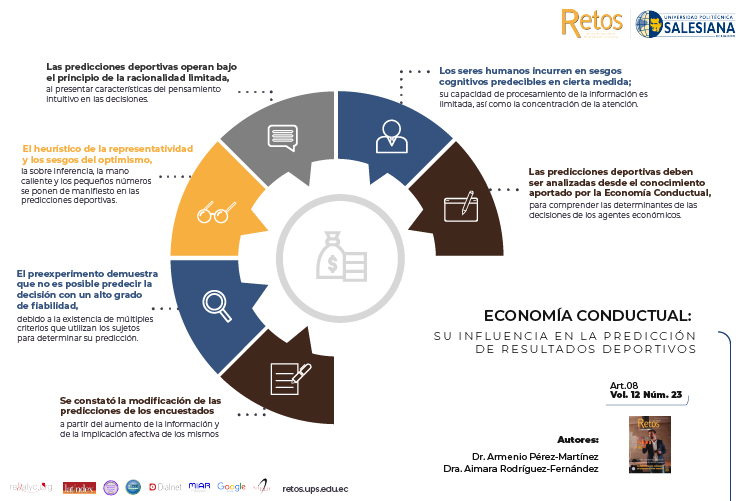Behavioral Economics: its influence on the prediction of sports results
Main Article Content
Abstract
Article Details

This work is licensed under a Creative Commons Attribution-NonCommercial-ShareAlike 4.0 International License.
Authorship: The list of authors signing must include only those people who have contributed intellectually to the development of the work. Collaboration in the collection of data is not, by itself, a sufficient criterion of authorship. "Retos" declines any responsibility for possible conflicts arising from the authorship of the works that are published.
Copyright: The Salesian Polytechnic University preserves the copyrights of the published articles, and favors and allows their reuse under the Creative Commons Attribution-NonCommercial-ShareAlike 3.0 Ecuador license. They may be copied, used, disseminated, transmitted and publicly displayed, provided that: i) the authorship and the original source of their publication (journal, editorial and work URL) are cited; (Ii) are not used for commercial purposes; Iii) mention the existence and specifications of this license.
References
Abitbol, P. y Botero, F. (2005). Teoría de Elección Racional: estructura conceptual y evolución reciente. Colombia Internacional, 62, 132-145. https://doi.org/10.7440/colombiaint62.2005.08
Allais, M. (1953). Le Comportement De L’homme Rationnel Devant Le Risque: Critique Des Postulats Et Axiomes De L’ecole Americaine. Econometrica, 21 (4), 503-546. https://doi.org/10.2307/1907921
Arechar, A.A.; Brandt, A. y Díaz, E (2018). Guía para conducir un experimento económico. Instituto Mexicano de Economía del Comportamiento. https://www.bi.team/wp-content/uploads/2016/09/v9-imec-vol-1-1.pdf
Arechar, A.A., Gachter, S. & Molleman, L. (2018). Conducting interactive experiments online. Experimental Economics, 21, 99-131. https://bit.ly/2TyBPxW
Arenas, J. D. (2021). Economía conductual de la protección al consumidor en el e-commerce colombiano. Cuadernos de Economía, 40(82), 1-23. http://www.scielo.org.co/pdf/ceco/v40n82/2248-4337-ceco-40-82-1.pdf
Attorresi, H.F., García, A.M. y Pralong, H.O. (2008). Sesgos en la estimación de probabilidades para dos situaciones secuenciales aleatorias. SUMMA Psicológica, 5 (1), 3-12. https://www.aacademica.org/000-073/92.pdf
Belaus, A., Reyna, C., & Freidin, E. (2016). Medición y manipulación de normas sociales en juegos experimentales de corrupción. Cuadernos de Economía, 35 (68), 353-377. https://doi.org/10.15446/cuad.econ.v35n68.44395
Bernoulli, D. (1954). Exposition of a new theory on the measurement of risk. Econometrika, 22 (1), 23-36. https://www.jstor.org/stable/1909829
Cortada, N. (2008). Los sesgos cognitivos en la toma de decisiones. International Journal of Psychological Research, 1(1), 68-73. https://doi.org/10.21500/20112084.968
Elster, J. (2002). Alquimias de la mente. La racionalidad y las emociones. Paidós.
Gilovich, T., Vallone, R. & Tversky, A. (1985). The hot hand in basketball: On the misperception of random sequences. Cognitive Psychology, 17(3), 295-314. https://doi.org/10.1016/0010-0285(85)90010-6
Greenwood, E. (1976). Experimental Sociology. A Study in Method. Octagon Books
Kahneman, D. (2017). Pensar rápido, pensar despacio. Debolsillo.
Kahneman, D. & Tversky, A. (1979). Prospect Theory: An Analysis of Desicion under Risk. Econometrica, 47(2), 263-291. https://doi.org/10.2307/1914185
Katona, G. (1951). Psychological Analysis of Economic Behavior. McGraw-Hill.
Koehler, J. J. & Conley, C.A. (2003). The “hot hand” myth in professional basketball. Journal of Sport and Exercise Psychology, 25(2), 253-259. https://bit.ly/3EgR411
López, M. (2016). La extensión tripartita de la teoría dual de razonamiento y sus repercusiones para las investigaciones sobre el autismo. Nóesis: Revista de Ciencias Sociales y Humanidades, 25 (50), 245-262. http://dx.doi.org/10.20983/noesis.2016.2.10
Matute, H. (2019). Ilusiones y sesgos cognitivos. Revista Investigación y Ciencia.es, noviembre de 2019, 55-60. https://bit.ly/31iumak
Miller (2006). Experimentos de orientación teórica. Una discusión metodológica. EMPIRIA. Revista de Metodología de Ciencias Sociales, 12, 89-110. https://bit.ly/3Ddy428
Morales, P. (2008). Estadística aplicada a las ciencias sociales. Universidad Pontificia de Comillas. https://bit.ly/3ocsNnc
Ostrom, E. (2000) Collective Action and the Evolution of Social Norms. Journal of Economic Perspectives, 14 (3), 137-158. https://bit.ly/3ltJ4md
Paul, R. J., Weinbach, A.P. & Humphreys, B.R. (2014). Bettor belief in the “hot hand”: Evidence from detailed betting data on the NFL. Journal of Sports Economics, 15(6), 636-649. https://doi.org/10.1177/1527002512465414
Pérez, A., y Rodríguez, A. (2020). Economía conductual y COVID-19: Una interpretación social de la realidad. Revista de Ciencias Sociales (Ve), XXVI(4), 507-514. https://doi.org/10.31876/rcs.v26i4.34646
Pérez, A., y Rodríguez, A. (2021). Heurísticos y sesgos cognitivos en el desempeño del empleado de servicios hoteleros. Revista Venezolana de Gerencia, 26(Especial 6), 426-438. https://bit.ly/3phjh1I
Simon, H.A. (1955). A Behavioral Model of Rational Choice. The Quarterly Journal of Economics, 69 (1), 99-118. https://doi.org/10.2307/1884852
Simon, H. A. (1957). Models of man: Social and rational. Wiley.
Stanovich, K. (1999). Who is rational? Studies of individual differences in reasoning. Erlbaum.
Subirán, J. (04 de diciembre de 2018). El resultado más repetido de la historia. Mundo Deportivo. https://bit.ly/3d9SvCH
Sugden, R. (2005). Experiment, Theory, World: A Sysposium on the Role of Experiments in Economics. Journal of Economic Methodology, 12 (2), 177-184. https://doi.org/10.1080/13501780500085943
Sunstein, C.R. & Thaler, R.H. (2017). Un pequeño empujón. El impulso que necesitas para tomar mejores decisiones en salud, dinero y felicidad. Taurus.
Tejedor-Estupiñán, J. M. (2020). La economía conductual, un campo multidisciplinar. Revista Finanzas y Política Económica, 12(1),9-13. https://bit.ly/3DirzuV
Torres-Salazar, C., Moreta-Herrera, R., Ramos-Ramírez, M., & López-Castro, J. (2020). Sesgo Cognitivo de Optimismo y Percepción de Bienestar en una Muestra de Universitarios Ecuatorianos. Revista Colombiana de Psicología, 29, 61-72. https://doi.org/10.15446/rcp.v29n1.7585 3
Tovar, J. (02 de junio de 2014). El marcador más frecuente de los Mundiales de Futbol. Gol y Fútbol. https://bit.ly/31mRxk5
Tversky, A. & Kahneman, D. (1971). Belief in the law of small numbers. Psychological Bulletin, 76(2), 105–110. https://doi.org/10.1037/h0031322
Tversky, A. & Kahneman, D. (1974). Judgment under Uncertainty: heuristics and biases. Science, New Series, 185 (4157), 1124-1131. 10.1126/science.185.4157.1124
Tversky, A. & Kahneman, D. (1983). Extensional versus intuitive reasoning: The conjunction fallacy in probability judgment. Psychological Review, 90(4), 293–315. https://doi.org/10.1037/0033-295X.90.4.293
Varela, C. y del Corral, J. (2019). Economía del comportamiento en el deporte. Papeles de Economía Española, 159, 72-89. https://bit.ly/3D7FT9G
Veinte Minutos. (21 de mayo de 2018). Champions League: ¿Cuál es el resultado más repetido en la Historia? Veinte Minutos. https://bit.ly/31nQPTE
Vega, A. (22 de noviembre de 2010). Resultado más y menos repetido en la historia de Primera División. La Liga en Números. https://bit.ly/31hgs8E
Vidal, G. (2008). La Teoría de la Elección Racional en las Ciencias Sociales. Sociológica, 23 (67), 221-236. https://bit.ly/3Dq9HPb

